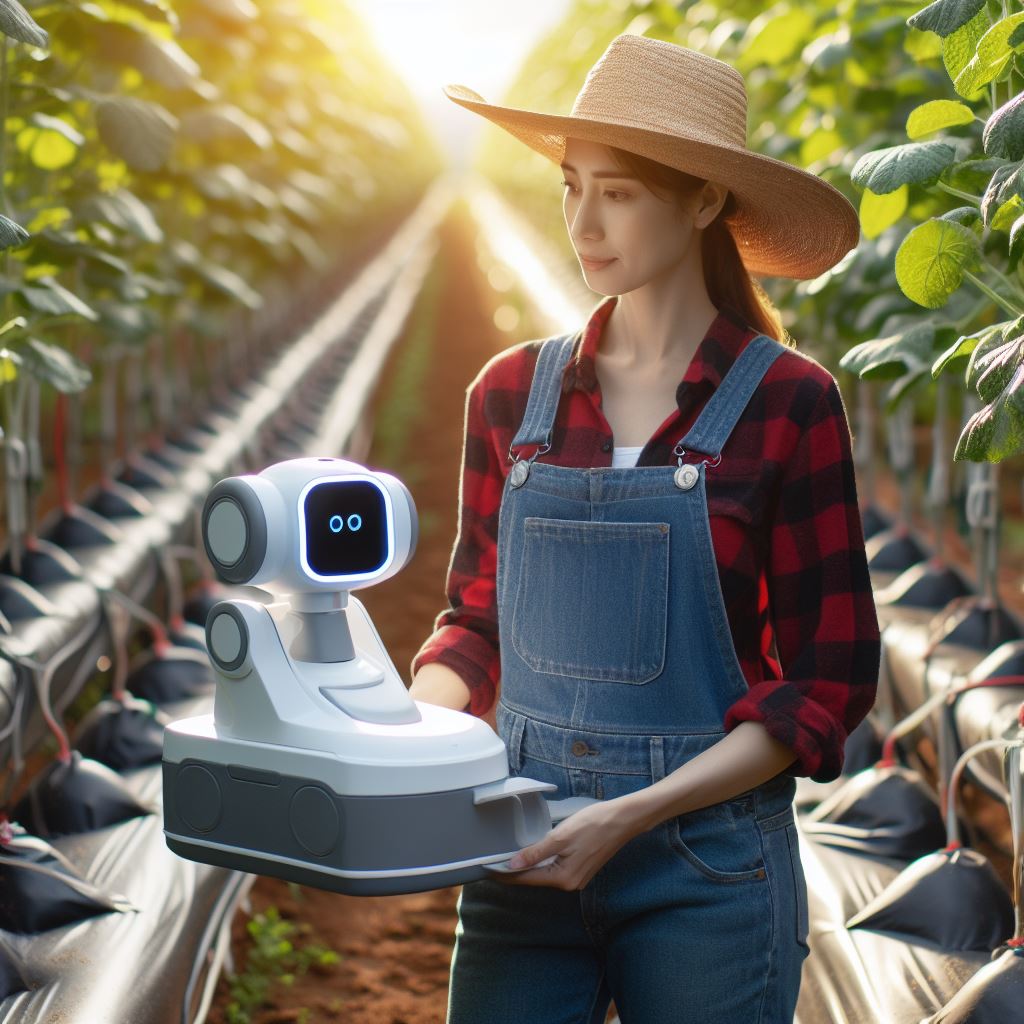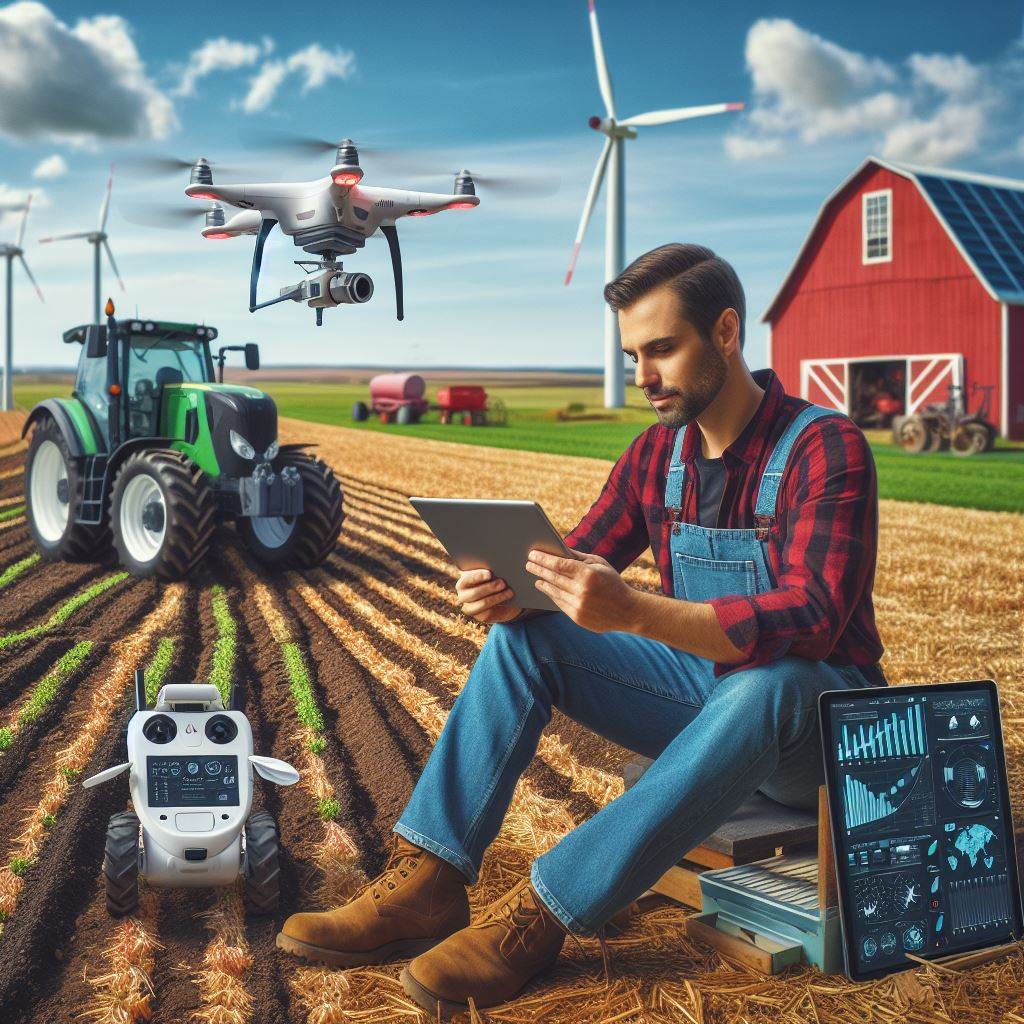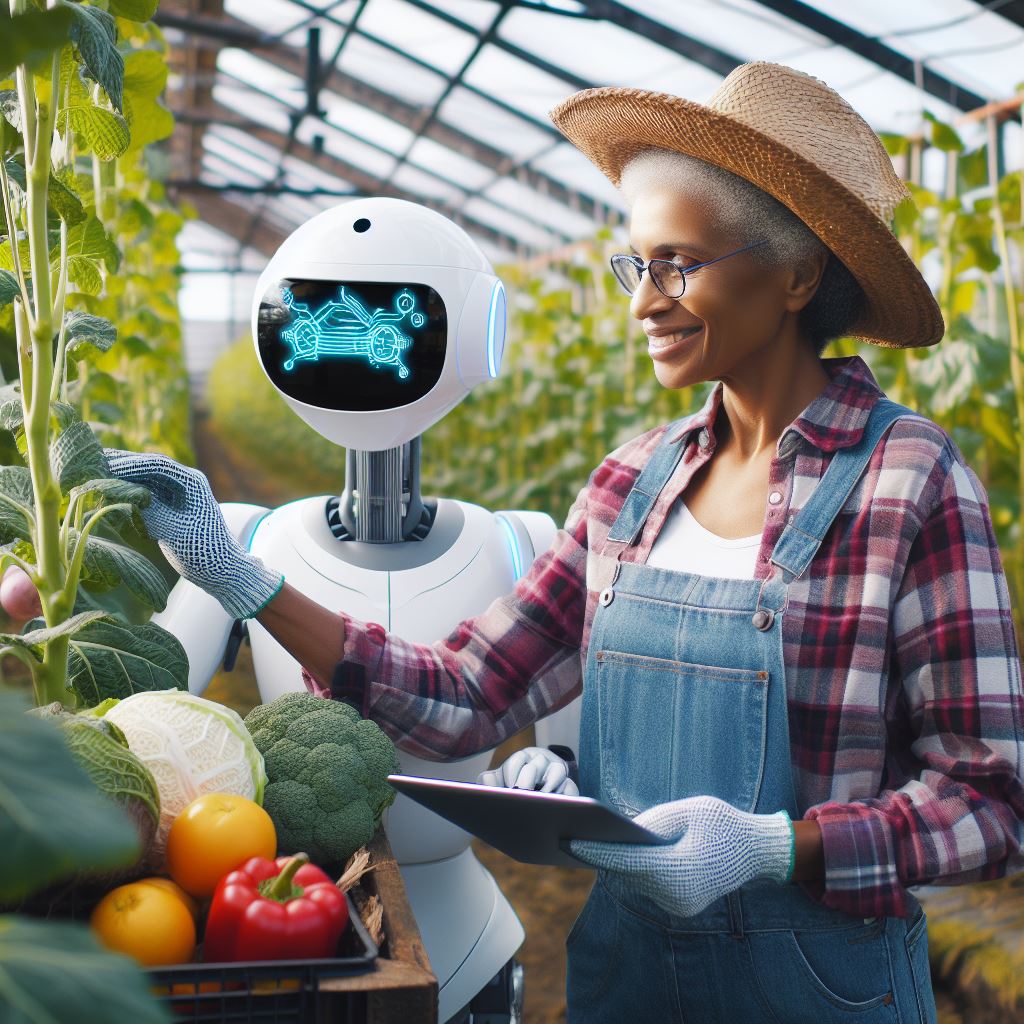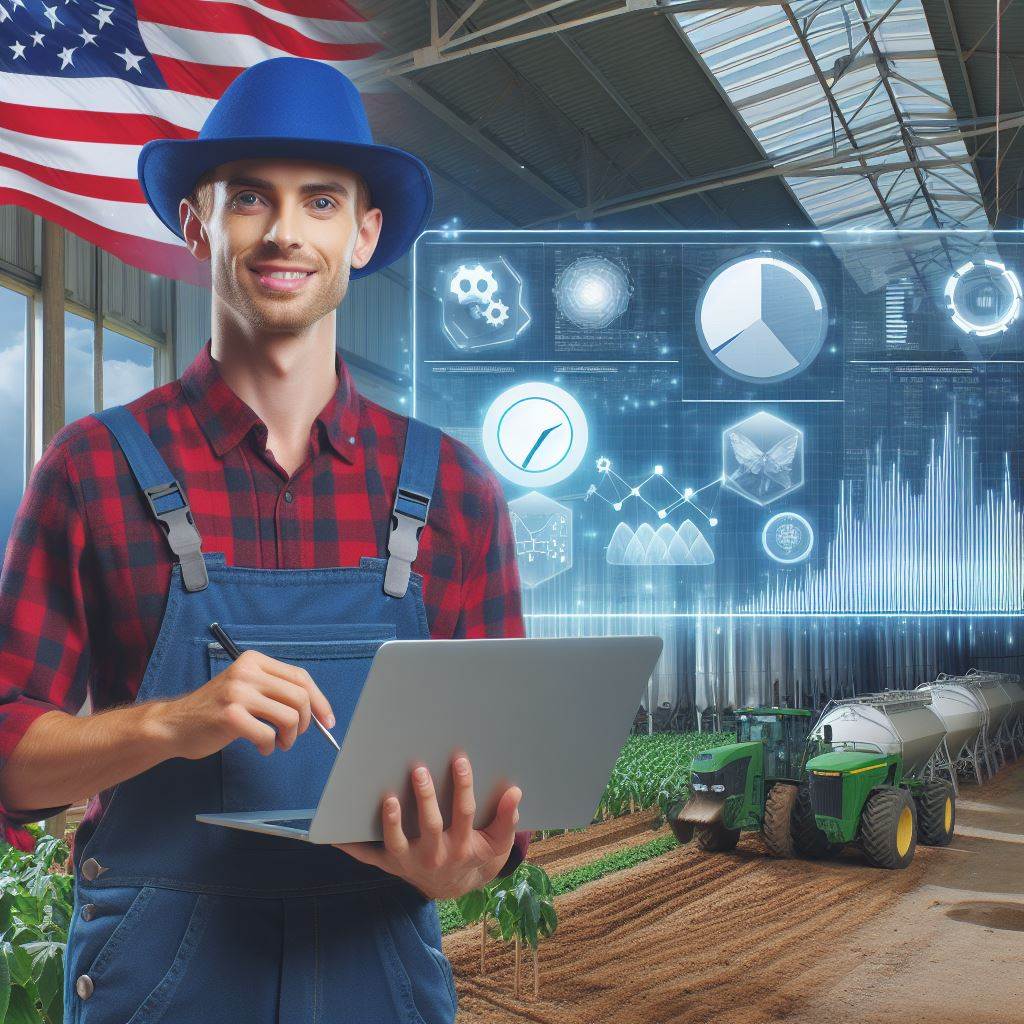Introduction
The concept of machine learning
The advent of the Machine Learning Farmer is transforming diverse sectors, with agriculture being no exception.
This advanced technology enables computers to learn patterns and make predictions without being explicitly programmed.
In the farming industry, where productivity and efficiency are crucial, machine learning can greatly benefit farmers.
Relevance of machine learning in the farming industry
Imagine a world where farmers no longer have to rely solely on their experience and intuition to make decisions.
With machine learning, farmers can analyze vast amounts of data collected from sensors, satellites, and drones to gain valuable insights.
These insights can help them make informed decisions about planting, irrigation, pest control, and even harvesting.
By using machine learning algorithms, farmers can optimize their crop yield and minimize resource wastage.
They can detect early signs of diseases or infestations, allowing for timely intervention.
Additionally, machine learning can enhance the accuracy of weather forecasting, aiding farmers in planning their activities accordingly and reducing potential losses.
The idea of machine learning as a farmer’s ally
The idea of using machine learning as a farmer’s ally might seem novel, but its potential is immense.
By leveraging this technology, farmers can maximize their profits, conserve resources, and contribute to sustainable agriculture.
It enables them to adapt to changing market dynamics and mitigate the risks associated with climate change and other uncertainties.
Intrigued by these possibilities, readers will embark on a journey to explore the transformative power of machine learning in the farming industry.
They will discover how this technology can empower farmers and reshape the way we approach agriculture.
Let us delve deeper into the world of machine learning as a farmer’s ally.
Transform Your Agribusiness
Unlock your farm's potential with expert advice tailored to your needs. Get actionable steps that drive real results.
Get StartedBenefits of Machine Learning in Agriculture
In the world of agriculture, the use of machine learning technology has revolutionized the industry.
This advanced technology has provided farmers with numerous benefits, transforming the way they approach farming and the overall efficiency of their operations.
Increased crop yield and efficiency
One of the significant advantages of machine learning in agriculture is the increased crop yield and efficiency it offers.
By analyzing vast amounts of data, such as weather patterns, soil nutrient levels, and plant health, machine learning algorithms can provide valuable insights to farmers.
These insights enable farmers to make informed decisions about planting, fertilizing, and harvesting, resulting in higher crop yields and improved overall efficiency.
Enhanced pest and disease management
Additionally, machine learning aids in enhanced pest and disease management.
By monitoring and analyzing data from sensors and cameras installed in fields, machine learning algorithms can detect the early signs of pests or diseases.
This early detection enables farmers to take prompt actions, such as targeted spraying or isolation, effectively controlling the spread of pests and diseases and minimizing crop damage.
Improved farm maintenance and operations
Moreover, machine learning technology contributes to improved farm maintenance and operations.
It can analyze data from sensors embedded in farming equipment, detecting potential machinery failures or malfunctions.
By identifying these issues in advance, farmers can schedule timely repairs, preventing costly breakdowns during critical farming periods.
This proactive approach to maintenance ensures smooth operations and minimizes downtime, ultimately increasing productivity.
Reduced waste and resource consumption
Machine learning also plays a crucial role in reducing waste and resource consumption in agriculture.
By analyzing historical data on water usage, fertilizers, and pesticides, machine learning algorithms can optimize resource allocation.
This optimization ensures that farmers use resources efficiently, minimizing waste and environmental impact.
Additionally, machine learning can provide real-time insights into soil moisture levels, allowing farmers to apply irrigation more precisely, further conserving water resources.
Potential for predictive analytics and forecasting
Furthermore, machine learning holds the potential for predictive analytics and forecasting in agriculture.
By analyzing historical climate data, plant growth patterns, and other relevant factors, machine learning algorithms can forecast future trends.
Farmers can leverage these forecasts to plan ahead, making informed decisions about when to plant, harvest, or protect crops from adverse weather conditions.
This predictive capability helps farmers minimize risks, maximize yields, and enhance overall operational efficiency.
Essentially, machine learning technology has brought numerous benefits to the world of agriculture.
From increased crop yield and efficiency to improved pest and disease management, the advantages are undeniable.
Additionally, machine learning contributes to better farm maintenance and operations, reduced waste and resource consumption, and the potential for predictive analytics and forecasting.
As technology continues to advance, its integration with agriculture will undoubtedly play a pivotal role in shaping the future of farming.
Showcase Your Farming Business
Publish your professional farming services profile on our blog for a one-time fee of $200 and reach a dedicated audience of farmers and agribusiness owners.
Publish Your ProfileRead: Future of Farming: AI and Machine Learning in Agri-Tech
Machine Learning Applications in Farming
In today’s tech-driven world, machine learning has emerged as a game-changer in various industries, including agriculture.
Farmers are leveraging the power of this technology to improve productivity, efficiency, and sustainability on their farms.
Let’s explore some key applications of machine learning in farming:
Crop Monitoring and Yield Prediction
Using machine learning algorithms, farmers can analyze data collected from sensors and drones to monitor crop health and growth.
These algorithms can also predict crop yield based on factors like weather conditions, soil moisture levels, and nutrient content.
By having accurate yield predictions, farmers can make informed decisions regarding harvesting, storage, and marketing of their crops.
Weed Detection and Automated Herbicide Application
Machine learning allows farmers to identify and classify different weed species in their fields.
With this information, they can use precision sprayers to apply herbicides only where needed, reducing the usage of chemicals and minimizing the environmental impact.
This targeted approach saves both time and money for farmers.
Disease and Pest Recognition and Prevention
Through machine learning models, farmers can detect early signs of diseases and pest infestations in their crops.
By analyzing sensor data and images, these models can identify specific patterns or symptoms that indicate the presence of a disease or pest.
With this knowledge, farmers can take preventive measures such as timely spraying of pesticides or adopting integrated pest management strategies.
Soil Analysis and Fertility Management
Machine learning algorithms can analyze soil data collected from various sources to determine its fertility and nutrient content.
This information helps farmers optimize the application of fertilizers and other soil amendments, ensuring that crops receive the necessary nutrients for healthy growth.
By efficiently managing soil fertility, farmers can also reduce the risk of nutrient runoff and groundwater contamination.
Livestock Monitoring and Health Prediction
Machine learning techniques enable farmers to monitor livestock behavior and health conditions.
By using sensors and wearable devices, data on factors like body temperature, heart rate, and feeding patterns can be collected and analyzed.
This real-time monitoring allows farmers to identify any signs of illness or distress early on, improving the overall health and welfare of their animals.
Weather Forecasting for Optimized Farming Practices
Accurate weather forecasting is crucial for making informed decisions related to farming operations.
Machine learning models can analyze historical weather data and other environmental factors to predict future weather patterns.
By knowing when to expect rainfall, temperature changes, or extreme weather events, farmers can plan irrigation schedules, optimize planting, and protect their crops from potential damage.
Machine learning has transformed farming into a more data-driven and precise industry.
By harnessing the power of this technology, farmers can make informed decisions, automate processes, and optimize resource utilization.
The applications discussed above are just a glimpse of how machine learning is revolutionizing the agricultural sector.
As technology continues to evolve, we can expect even more innovations that will enhance farming practices and contribute to a sustainable and food-secure future.
Read: Big Data’s Role in Future Farming
Challenges and Limitations of Machine Learning in Agriculture
Machine learning has proved to be invaluable in the agriculture sector, aiding farmers in making data-driven decisions.
However, there are several challenges and limitations that need to be addressed for its successful implementation.
Limited availability and accessibility of data
One of the key challenges faced by farmers is the lack of readily available and accessible data.
Machine learning models require large datasets to generate accurate predictions, which can be a significant hurdle for farmers.
Efforts should be made to gather and maintain high-quality data through collaborations between farmers, researchers, and agricultural organizations.
Need for specialized knowledge and expertise
Implementing machine learning in agriculture requires a deep understanding of data analysis and complex algorithms.
Farmers may lack the necessary skill set to leverage this technology effectively.
Training programs and workshops should be conducted to upskill farmers and equip them with the knowledge required for successful implementation.
High initial investment and cost of implementation
The initial investment and overall cost of implementing machine learning systems can be significant, making it unaffordable for small-scale farmers.
Governments and agricultural institutions should provide financial incentives, grants, and subsidies to make these technologies more accessible to farmers.
Ethical considerations and data privacy concerns
Machines learning in agriculture involves collecting and analyzing vast amounts of data, raising concerns about privacy and ethical considerations.
Farmers need assurance that their data will be handled responsibly.
Robust data privacy policies and regulations should be put in place, ensuring that farmers’ data is protected and used ethically.
Showcase Your Farming Business
Publish your professional farming services profile on our blog for a one-time fee of $200 and reach a dedicated audience of farmers and agribusiness owners.
Publish Your ProfileBiases and limitations in machine learning algorithms
Machine learning algorithms are subject to biases and limitations, which can impact the accuracy and fairness of predictions.
These biases need to be identified and addressed to ensure equitable outcomes.
Regular monitoring and evaluation of machine learning models should be conducted to identify and rectify any biases or limitations.
In general, while machine learning holds immense potential in revolutionizing agriculture, there are challenges and limitations that need to be overcome.
By addressing data availability, knowledge gaps, affordability, ethical concerns, and algorithmic biases, machine learning can truly become a farmer’s ally.
Read: AI in Farming: Boosting Yields Smartly

Case Studies and Success Stories
Successful Implementations of Machine Learning in Farming
Machine learning, with its ability to process vast amounts of data and make predictions, has become a valuable tool for farmers worldwide.
This section discusses some real-world examples of successful machine learning implementations on farms and how they have positively impacted the agricultural industry.
Precision Agriculture
In precision agriculture, machine learning algorithms analyze data from sensors and satellites to optimize crop yield and reduce waste.
For example, a corn farmer in Iowa used machine learning to predict the optimal irrigation schedule, resulting in a 20% reduction in water usage without compromising yield.
Livestock Monitoring
Machine learning is transforming livestock monitoring by automatically analyzing video feeds to detect animal behavior patterns.
A dairy farmer in New Zealand implemented a machine learning-based system that detected early signs of illness in cows, allowing for timely intervention and minimizing herd losses.
Plant Disease Identification
Machine learning models have been developed to accurately identify plant diseases by analyzing images of infected leaves or fruits.
In India, a cotton farmer utilized such a model to detect the presence of bollworm infestation in his crops early on. The timely application of targeted insecticides saved his yield and reduced costs.
Crop Yield Prediction
By analyzing historical weather data and crop characteristics, machine learning algorithms can predict crop yields.
A soybean farmer in Brazil used a predictive model to estimate his harvest and make informed decisions about storage and marketing. This resulted in improved profitability and reduced wastage.
The Potential for Scalability and Widespread Adoption
These success stories highlight the potential scalability and widespread adoption of machine learning in farming.
The benefits are manifold:
Increased Efficiency
Machine learning enables farmers to optimize resource allocation, such as water usage, fertilizer application, and pest control.
This leads to higher efficiency and cost savings while minimizing environmental impacts. Farmers can achieve higher yields with fewer resources.
Early Intervention
Through early detection of diseases, pests, or anomalies in crop growth, farmers can intervene promptly and mitigate potential damage.
This reduces losses and ensures healthier plants with minimal use of chemical interventions.
Data-Driven Decision Making
Machine learning provides farmers with actionable insights by analyzing vast amounts of data, such as weather patterns, soil quality, and market trends.
This helps them make informed decisions regarding planting, harvesting, pricing, and more.
Sustainable Agriculture
By optimizing resource usage and reducing wastage, machine learning promotes sustainable agriculture.
This is crucial in addressing the increasing global demand for food while minimizing the ecological footprint of farming practices.
As machine learning algorithms continue to evolve and become more accessible, their potential for transforming farming practices becomes even more significant.
However, challenges remain, such as data quality, privacy concerns, and the need for specialized knowledge.
Nevertheless, the positive impact of machine learning on the agricultural industry cannot be overstated.
With successful implementation case studies and the potential benefits it offers, machine learning is rightly called a farmer’s ally.
Read: Elevating Agriculture with Drone Innovations
Future Outlook and Opportunities
In recent years, machine learning has emerged as a powerful ally for farmers, revolutionizing the agriculture industry.
However, the potential advancements and innovations in this field are far from being exhausted.
Looking ahead, there are several exciting possibilities that could further transform farming practices.
Integration with Emerging Technologies
One of the most promising areas of growth for machine learning in agriculture is its integration with emerging technologies.
Drones, for instance, can be equipped with machine learning algorithms to gather real-time data on crop health and identify potential issues.
This information can then be used to optimize irrigation, fertilization, and pest control.
Moreover, the Internet of Things (IoT) can play a pivotal role in connecting various devices and sensors on the farm, facilitating the collection of valuable data.
Machine learning algorithms can harness this data to provide farmers with timely insights and predictions.
For example, they can forecast weather patterns, optimize planting schedules, and even detect crop diseases at an early stage.
Showcase Your Farming Business
Publish your professional farming services profile on our blog for a one-time fee of $200 and reach a dedicated audience of farmers and agribusiness owners.
Publish Your ProfileAdditionally, robotics is another emerging technology with immense potential to collaborate with machine learning in farming.
Autonomous robots equipped with machine learning algorithms can carry out a variety of tasks, ranging from seeding and harvesting to weed control.
These robots can operate with precision and efficiency, minimizing human labor and maximizing productivity.
Role in Sustainable and Precision Agriculture
Machine learning also plays a crucial role in advancing sustainable and precision agriculture.
By analyzing vast amounts of data, machine learning algorithms can help farmers make informed decisions, reducing the use of resources such as water and fertilizer.
Sustainability practices like precision irrigation, where water is provided only where and when it is needed, can significantly conserve water.
Machine learning enables farmers to precisely determine soil moisture levels and adjust irrigation accordingly, promoting sustainable practices and conserving this precious resource.
Precision agriculture, on the other hand, involves tailoring agricultural practices to specific areas within a field, considering variations in soil composition, topography, and other factors.
Machine learning algorithms can analyze historical data and generate predictive models, enabling farmers to optimize inputs like fertilizers and pesticides.
This targeted approach minimizes wastage and reduces environmental impact.
Role of Government and Industry
To fully realize the potential of machine learning in farming, the collaboration between government and industry is crucial.
Governments can promote the adoption of machine learning technologies by providing financial incentives, subsidies, and research grants.
This would encourage farmers to invest in the necessary infrastructure and equipment.
Industry players also have a pivotal role to play in supporting the development and implementation of machine learning solutions for farming.
By investing in research and development, they can drive innovation and create user-friendly tools and software that cater specifically to the needs of farmers.
Furthermore, industry giants can collaborate with startups and research institutions to foster knowledge transfer and exchange.
This synergy between different stakeholders can accelerate the adoption and widespread use of machine learning in agriculture.
In essence, the future of machine learning in farming holds great promise.
Through its integration with emerging technologies, such as drones, IoT, and robotics, and its role in sustainable and precision agriculture, machine learning can bring about transformative changes in how we produce food.
Government support and industry collaboration are vital to ensure the smooth adoption and continued progress of machine learning in agriculture.
With these combined efforts, farmers stand to benefit from increased productivity, reduced environmental impact, and ultimately, a more sustainable and efficient agriculture sector.
Conclusion
Machine learning has proven to be a valuable ally for farmers, revolutionizing agriculture practices.
The benefits of machine learning in agriculture are numerous and wide-ranging.
It enables farmers to make data-driven decisions, improving crop yields and reducing waste.
Machine learning algorithms can accurately predict weather patterns, pests and diseases, helping farmers take preventive measures.
Furthermore, it optimizes resource allocation, reducing costs and maximizing efficiency.
Embracing technology is crucial for the future of farming, as it holds the key to sustainable and profitable agriculture.
By incorporating machine learning systems, farmers can overcome challenges and stay ahead in a rapidly changing industry.
Farmers should be encouraged to explore the potential of machine learning and collaborate with experts in the field.
By working together, farmers and machine learning experts can customize solutions and implement them effectively.
With continuous advancements in technology, the possibilities for machine learning in agriculture are endless.
It is essential that farmers stay open to these innovations and embrace them to secure a prosperous future for agriculture.
In a nutshell, machine learning is a game-changer for farmers, and its applications are invaluable for the growth and sustainability of the agricultural sector.





Can you any kind of dataset including parameters are soil moisture, humidity, Temperature, PH of soil, N,P,K value of soil.
Can you rephrase the question so I understand your comment better?